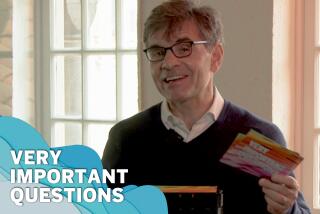UCI Course Zeroes In on Women’s Role in War
It’s clear, says Juliet MacCannell, that women at home are in as much danger as soldiers in the field if a nuclear or conventional war were to erupt.
And that’s one of the reasons that the UC Irvine associate professor is teaching a course entitled “Women and War” in the English/comparative literature department.
“Some truths can only be taught in literary form,” said the Irvine resident, who holds degrees from UC Riverside and Cornell University. “And I’ve been interested and very concerned in the deep transformation in the arrangement between the sexes.”
MacCannell, director of women’s studies, said she has an interest in the “grand social movements” in the world and that includes what would happen in the event of a war.
“Everyone would become a soldier at home even if it is a conventional war,” said MacCannell, an author and world traveler who rarely takes a trip for the fun of it.
“A number of years ago, I took a cruise for a week where I could relax, and I remember that trip very clearly,” she said. “It seems as if I’m constantly busy now and I really don’t like that. Everyone needs time to relax.” Her class, which may be unique in the academic establishment throughout the country, has attracted 40 students, most of them women.
“We get into some lively discussions,” said MacCannell who, flies to the Bay Area on weekends to be with her husband, Dean MacCannell, a professor at UC Davis. “It’s a stimulating class, and it has its own kind of excitement.”
Part of the discussions are motivated by reading 10 novels and textbooks that define the role of women during a time of crisis. She said it gives students a look at their possible participation if a conflict were to arise.
The books relate male roles during wartime, but some describe the role of women during the conflict.
MacCannell noted that in World War II, when men went off to fight in combat, women were prepared for their role such as “Rosie the Riveter” and others who helped build fighting machines and raise money for the war effort.
She tells her students that they are part of a generation whose roles could be different if another war were to occur.
However, she feels that if students taking the course understand the linking of women and war, it could help avert another one.
Besides teaching in college all her adult life, MacCannell has written two books. Her third effort, “The Regime of the Brother,” a study of literary texts from the 18th Century to the present, will be published next year.
Before deciding on teaching, MacCannell had thoughts of becoming an artist “but I had a very inquiring mind and probably wouldn’t have been happy,” she said. “I have a more critical than creative mind, and in the long run, I made the right move.”
But she added: “It’s interesting that I started thinking the other way.”
During the holiday season, it’s always fun to hear Santa Claus when he uses the ham radio call letters WD6 BPT at St. Jude Hospital and Rehabilitation Center in Fullerton.
He identifies the station as Whiskey Delta 6, Bed Pan Trainer.
The medical facility has had a ham radio since October, 1977. It was donated to the hospital by the wife of a ham operator who died, coincidentally at a time when April Moell, the hospital’s director of occupational therapy, had just received her ham license.
She set up a Rehab Radio program to help patients with speech skills, coordination, socializing and to expand their attention span.
It was also used to direct heavy equipment to certain locations in San Francisco after the earthquake.
Eleanor Ray, 10, of Fountain Valley and a student at Roch Courreges Elementary School, writes for Bare Essentials, a kid’s monthly newspaper.
She just got her biggest scoop.
“He was a very nice man and was talking like a regular, normal human being,” she said of her 30-minute interview with Ronald Reagan in Century City..
She had written the former President months ago asking for the interview, which she said touched on a number of subjects.
And as a final gesture, she said, Reagan played Taps on his harmonica.
“He said it was the only song he really knew how to play,” Eleanor observed.
Acknowledgments--Dr. Kent Wright, an El Toro equine veterinarian, was picked from 50,000 entries submitted by veterinarians to win a Chevrolet pickup equipped with a mobile equine clinic unit. The truck was given by Ft. Dodge Laboratories, Iowa-based manufacturer of veterinary pharmaceuticals.
More to Read
Sign up for our Book Club newsletter
Get the latest news, events and more from the Los Angeles Times Book Club, and help us get L.A. reading and talking.
You may occasionally receive promotional content from the Los Angeles Times.






